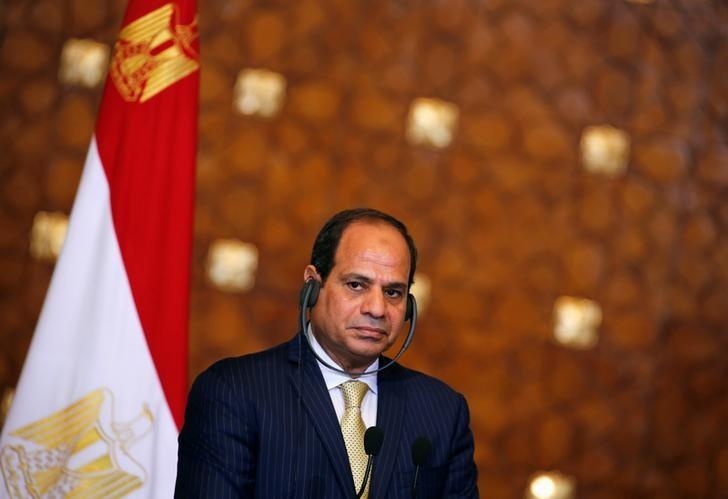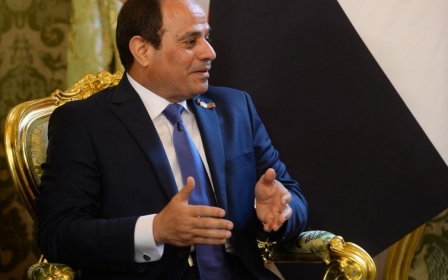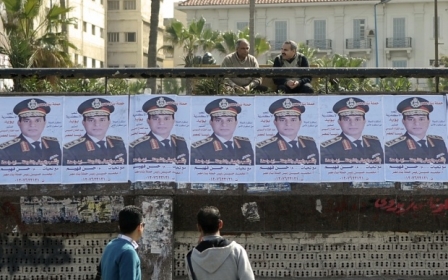Egypt's Sisi suffers fresh batch of purported leaks from inner circle

The inner circle of Egypt’s President Abdel Fattah al-Sisi has been hit by a fresh wave of leaked alleged audio recordings, casting doubt on the security of the president's confidants.
The purported leaks, first broadcast by opposition news channel Mekameleen on Tuesday night, appear to contain significant revelations about the level of internal opposition to Sisi from within the upper echelons of his political circle.
The discussions – with voices attributed to Sisi himself, as well as his foreign minister, Sameh Shoukry – relate to recent events, including a bombing in December 2016 and a meeting between Shoukry and then-US Vice President-elect Mike Pence later that month.
The fresh batch of leaks comes 18 months after earlier recordings – also made public by Mekameleen – revealed far-reaching Emirati “interference” in Egypt, as well as the extent of Sisi’s control over domestic media outlets.
Those leaks were the result of a phone-tapping operation that targeted Sisi’s chief of staff, Kamel Abbas.
An investigation of the earlier leaks by independent audio forensics experts in the UK revealed a “moderately strong” probability that the taped conversations were genuine.
The new leaks could not be immediately verified.
Meeting with Mike Pence
In the first of five recordings, Egyptian Foreign Minister Sameh Shoukry is heard discussing his meeting with Pence early in December.
“I’ve just arrived back from a meeting with the vice president-elect,” Shoukry says in the recording.
“I conveyed to him and through him to the president [elect Donald Trump] your message of congratulations and interest in working jointly to confront challenges, as well as the importance of restoring strategic relations.”
Relations between Cairo and Washington, traditionally strong allies, have suffered serious setbacks over recent years since the military coup that brought Sisi to power in 2013.
Former US President Barack Obama halted weapons sales to Egypt in October 2013, and unfroze them in March 2015.
However, Obama continued to make critical statements regarding human rights in Egypt.
In contrast, Shoukry describes Pence as “very amicable,” saying he had expressed Trump’s support for “working with Egypt to achieve stability in the region and fighting terrorism to finish it off”.
Shoukry also references meetings with the Brookings Institution, a Washington-based think-tank, as well as media outlets based in the US.
Positive interactions with Clinton team
A separate earlier discussion between Shoukry and Sisi suggested that Hillary Clinton - then running for US president - had resisted pressure to take a hard line on Egypt.
Shoukry, apparently speaking in October 2016, suggests Clinton opted instead for friendly relations with Sisi, despite earlier criticism of his human rights record.
“One of [Clinton’s] assistants, who was in the Obama administration, had proposed an extreme position, but she preferred to interact with Egypt,” Shoukry says, according to the leaks.
“She believes that giving Egypt incentives is the ideal means for dealing with the issue, rather than putting us under pressure.”
'She believes that giving Egypt incentives is the ideal means for dealing with the issue, rather than putting us under pressure' - Sameh Shoukry on Hillary Clinton
The “positive” impression Shoukry reportedly received from Clinton’s position on Egypt – from one of Clinton’s campaign assistants in New York – appears to represent a turnaround from Clinton’s earlier public criticism of Cairo’s human rights record.
During a meeting with Sisi the previous month, Clinton had reportedly highlighted the deteriorating human rights situation in Egypt, calling on the president to release political prisoners and stressing that strengthening the rule of law was crucial for securing Egypt’s “future progress”.
Back in September 2015, a member of the Egyptian Parliament’s Foreign Relations Committee slammed Clinton for her soft stance on the Brotherhood.
“I think 90 percent of Egyptians would prefer Trump because he will not cooperate with terrorists,” Ahmed Gad told US right-wing website Breitbart at that time.
Syria peace talks
Another leaked recording is a discussion between Shoukry and Sisi regarding a key round of Syria peace talks hosted in the Swiss city of Lausanne in October 2016, suggesting that the US actively opposed Egypt’s involvement in the negotiations, but had its hand forced by Iran, a major backer of Syrian President Bashar al-Assad.
“[Then-US Secretary of State John] Kerry spoke to me about an hour and a half ago and proposed that I attend the Lausanne meeting,” Shoukry says in the leaks.
“He told me clearly that [Iranian Foreign Minister] Jawad Zarif made it a condition that Egypt attend.”
Kerry had earlier “excluded” Egypt from the meeting, Shoukry adds, justifying the decision by saying the talks were only for “parties that have military impact on the ground, and therefore they did not want to involve Egypt”.
“The invitation came after they initially decided not to invite us,” Shoukry says. “The Russians proposed inviting us but it was the Americans who initially objected. The Russians [then] did not insist.”
The discussion concludes with Shoukry saying he will “get [Kerry] to issue a statement in which he stresses that he extended the invitation.
“We will also…issue [a statement] that I received the invitation from him.”
Deliberations with the GCC
A fourth recording relates to a suicide bomb attack at Cairo's main Coptic cathedral in December last year that killed at least 25 people.
After the bombing, Egypt accused Qatar of hosting the attackers – the allegations put Egypt’s relations with the Gulf Cooperation Council (GCC), whose members have bankrolled much of its economy for years, under heavy strain.
Following the accusations, GCC Secretary-General Abdullatif bin Rashid al-Zayani issued a statement urging Egyptian officials to confirm the accuracy of any information regarding attacks before going to the press.
“Issuing hasty statements without confirming them affects the strong relations between the GCC and the Arab Republic of Egypt," Zayani said at the time.
In the recording, Shoukry is heard complaining that Saudi Arabia was exploiting the row to worsen tensions with Egypt.
“The Saudis exploited it as a means of continuing the tension with us,” Shoukry says.
'The Saudis exploited it as a means of continuing the tension with us'
It also reveals the key mediation role played by Kuwait in smoothing a growing rift between Egypt and its backers in the Gulf.
“Countries such as Kuwait may have intervened to mitigate the language [of the GCC statement] so that it is more balanced,” Shoukry says.
Kuwait's mediation
The final of the five leaked recordings released on Tuesday night again highlighted the key role played by Kuwait in mediating talks between Egypt and Gulf states, which have broadly backed Sisi despite an often fractious relationship.
In the recording, Shoukry purportedly tells Sisi that Sheikh Sabah, Kuwait’s foreign minister, attempted to mend Egypt’s relations with the GCC and diffuse the tensions that had built up over a rapprochement between the UAE and Turkey, and Saudi Arabia’s decision to cut off petroleum supplies to Egypt in November 2016.
Shoukry claims to have been told that Sabah was commissioned by the Emir of Kuwait “to meet with [Saudi foreign minister] Adil Al-Jubair and [UAE state minister] Adil Qarqash… [to] convey to them …the necessity of ending the tension in the Egyptian-Saudi relations.
“[The Emir] stressed that this is not the time for disagreements and that it is necessary to support Egypt.”
Shoukry goes on to claim that Sabah had conveyed to the GCC ministers “the importance of resuming petroleum [supplies] and supporting Egypt... [due to] Egypt’s significance in supporting the Gulf states.”
“It was obvious that he considered the UAE to be in solidarity with Saudi Arabia,” Shoukry is purported to have said.
The Egyptian government remained largely silent about the batch of leaks that came out midway through 2015, although then prime minister Ibrahim Mahlab cast doubt on the credibility of the channel broadcasting the recordings, saying “nobody in Egypt believes the channels of the Muslim Brotherhood”.
Middle East Eye propose une couverture et une analyse indépendantes et incomparables du Moyen-Orient, de l’Afrique du Nord et d’autres régions du monde. Pour en savoir plus sur la reprise de ce contenu et les frais qui s’appliquent, veuillez remplir ce formulaire [en anglais]. Pour en savoir plus sur MEE, cliquez ici [en anglais].




